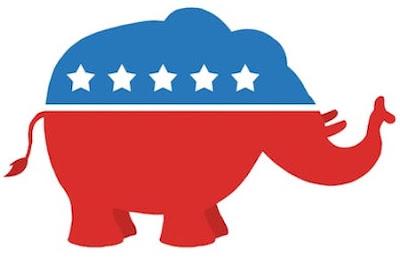 I have never voted for a Republican, but there have been Republicans in the past that I could respect. They were the loyal opposition, and they provided a valuable service to the country.
I have never voted for a Republican, but there have been Republicans in the past that I could respect. They were the loyal opposition, and they provided a valuable service to the country.I disagreed with them on many issues (especially in the area of economics), but they were not my enemy. They were good Americans that loved their country -- they just had a different vision of what was good for all our citizens.
I can no longer say that. Today's Republican Party is not that of your father or grandfather. They have abandoned the principles and values they once held. They are now nothing more than a cult worshipping Donald Trump -- and they believe whatever Trump tells them to believe.
Here's how Republican Stuart Stevens describes the sad state of his once proud party in an op-ed for The Washington Post:
Here’s a question: Does anybody have any idea what the Republican Party stands for in 2020? One way to find out: As you are out and about marking the new year, it is likely you will come across a Republican to whom you can pose the question, preferably after a drink or two, as that tends to work as truth serum: “Look, I was just wondering: What’s the Republican Party all about these days? What does it, well, stand for?” I’m betting the answer is going to involve a noun, a verb and either “socialism” or “Democrats.” Republicans now partly define their party simply as an alternative to that other party, as in, “I’m a Republican because I’m not a Democrat.” In a long-forgotten era — say, four years ago — such a question would have elicited a very different answer. Though there was disagreement over specific issues, most Republicans would have said the party stood for some basic principles: fiscal sanity, free trade, strong on Russia, and that character and personal responsibility count. Today it’s not that the Republican Party has forgotten these issues and values; instead, it actively opposes all of them. Republicans are now officially the character doesn’t count party, the personal responsibility just proves you have failed to blame the other guy party, the deficit doesn’t matter party, the Russia is our ally party, and the I’m-right-and-you-are-human-scum party. Yes, it’s President Trump’s party now, but it stands only for what he has just tweeted. A party without a governing theory, a higher purpose or a clear moral direction is nothing more than a cartel, a syndicate that exists only to advance itself. There is no organized, coherent purpose other than the acquisition and maintenance of power. This is a sad fall. In Ronald Reagan’s America, being born an American was to win’s life lottery; in Donald Trump’s America, it makes you a victim, a patsy, a chump. Trump didn’t hijack the GOP and bend it to his will. He did something far easier: He looked at the party, saw its fault lines and then offered himself as a pure distillation of accumulated white grievance and anger. He bet that Republican voters didn’t really care about free trade or mutual security, or about the environment or Europe, much less deficits. He rebranded kindness and compassion as “PC” and elevated division and bigotry as the admirable goals of just being politically incorrect. Trump didn’t make Americans more racist; he just normalized the resentments that were simmering in many households. In short, he let a lot of long-suppressed demons out of the box. . . . This impeachment moment and all that has led to it should signal a day of reckoning. A party that has as its sole purpose the protection and promotion of its leader, whatever he thinks, is not on a sustainable path. Can anyone force a change? I’m not optimistic. Trump won with 46.1 percent of the vote in 2016, while Mitt Romney lost with 47.2 percent in 2012; no wonder Republicans have convinced themselves that the path to victory and power lies with angry division. Having ignored the warning signs for years myself, I know the seductive lure of believing what you prefer while ignoring the obvious truth. Which is this: We are a long way — more than a half-century — from 1968, much less 1952. The United States is now a diverse, chaotic collection of 330 million people, a country of immigrants and multiculturalism that is growing less white every day. It is not some gauzy Shangri-La of suburban bliss that never existed. I’d like to say that I believe the party I spent so many years fighting for could rise to the challenge of this moment. But there have been too many lies for too long.

